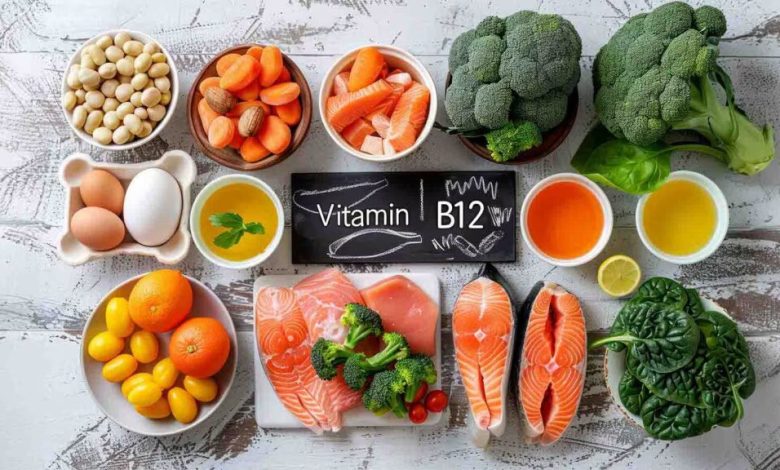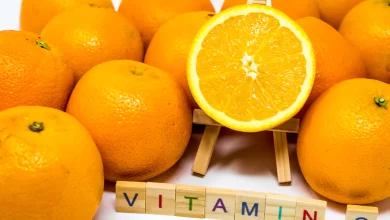10 Tips to Increase Vitamin B12 Through Food, Supplements and Lifestyle

Cobalamin, another name for vitamin B12, is a water-soluble vitamin that is necessary for several body processes. It is essential for the upkeep of healthy nerve cells, the synthesis of DNA, and the creation of red blood cells. We must rely on food or supplements as our bodies are unable to create vitamin B12 on their own. People who enjoy eating fish or eggs can obtain their recommended daily intake of vitamin B12. Ultimately, it is primarily present in meals derived from animals, including dairy, eggs, and meat. Vegetarians and vegans have options as well. Whether you eat meat or not, there are practical methods to raise your body’s level of vitamin B12.
Why is vitamin B12 important?
Vitamin B12 plays a crucial role in multiple essential activities.
1. Red blood cell formation
Red blood cell formation, which is in charge of distributing oxygen throughout the body, depends on it. “Anemia, a disorder that can make you feel weak and exhausted, can result from a vitamin B12 deficiency,” says internal medicine specialist Dr. Brij Vallabh Sharma.
2. DNA synthesis
The genetic material found in every cell is called deoxyribonucleic acid, or DNA, and it needs vitamin B12 to properly develop. Cell division and repair activities may be compromised in the absence of sufficient B12. Vitamin B12 intake for adults 19 to 64 years of age should be about 1.5 micrograms per day, according to the UK National Health Service.
3. Nervous system maintenance
The myelin sheath, a covering that protects nerve fibers, depends on vitamin B12. A lack of vitamin B12 can cause neurological problems such as tingling, numbness, and cognitive decline.
4. Energy production
The body uses glucose, one of its main energy sources, which is produced in part by vitamin B12. “Lethargy and decreased stamina can result from a lack of this vitamin,” the specialist explains.
What are the ways to increase vitamin B12?
You need to take more vitamin B12 if you are weak and have signs of a vitamin B12 deficiency, such as tingling in the hands and feet, memory loss, and numbness. Here are some pointers:
1. Consume animal-based foods
Vitamin B12 can be found in red meat, poultry, and eggs, according to the US National Institutes of Health. Thus, consuming these foods on a regular basis can aid in maintaining appropriate B12 levels.
2. Eat organ meats
Lamb liver and kidney are among the most abundant sources of vitamin B12. According to the U.S. Department of Agriculture, 100 grams of lamb liver provides 3571 percent of the Daily Value for vitamin B12.
3. Include fish and seafood
“Shellfish like clams and crabs, as well as fish like salmon, trout, and tuna, are all good sources of B12,” Dr. Sharma states. The USDA states that 178 grams of cooked salmon can supply 208% of the daily value (DV) of vitamin B12.
4. Consume dairy products
You can have milk, cheese, and yogurt if you don’t like meat or fish. You can maintain adequate B12 levels by eating these in your diet as they are also strong sources of B12.
5. Eat fortified foods
Vitamin B12 is absent from foods including fruits, cereals, and vegetables. Thus, those who are vegans, vegetarians, or who cannot eat animal products should choose meals supplemented with vitamin B12. “They can incorporate plant-based milk into their daily diet along with breakfast cereals,” advises the specialist.
6. Use nutritional yeast
Since nutritional yeast is frequently enhanced with vitamin B12, it is a suitable substitute for veganism. The US National Institutes of Health state that 2.4 mcg of vitamin B12 can be found in one tablespoon of enriched nutritional yeast. It can be used as a seasoning in cooking or sprinkled on foods like popcorn.
7. Take B12 supplements
B12 deficiency can be prevented easily with oral supplements or multivitamins that contain B12. This is especially true for older adults or people with impaired absorption. The UK’s National Health Service states that you can safely use vitamin B12 supplements in amounts of no more than 2 mg per day.
8. Consider B12 injections
According to Dr. Sharma, “there can be cases of severe deficiency or malabsorption, such as in pernicious anemia.” Doctors administer B12 injections in these cases to rapidly restore levels.
9. Check for digestive health
The digestive system must be robust and in good health in order to absorb vitamin B12. Therefore, treating illnesses like Crohn’s disease, gastritis, or other gastrointestinal disorders can enhance your body’s absorption of vitamin B12.
10. Avoid foods that can interfere with Vitamin B12
According to the expert, consuming excessive amounts of alcohol might harm the stomach lining and lower the creation of intrinsic factor, a protein required for the absorption of vitamin B12. Watch how much fiber you eat as well, as too much of it might bond with vitamin B12 and lessen the gut’s ability to absorb it.
Daily intake of vitamin B12 is optimum, but if intake varies somewhat from day to day, the body can still maintain adequate levels because it is stored in the liver. Regularly consuming vitamin B12, either through food or pills, guarantees that you get the daily amount required and stay healthy.




